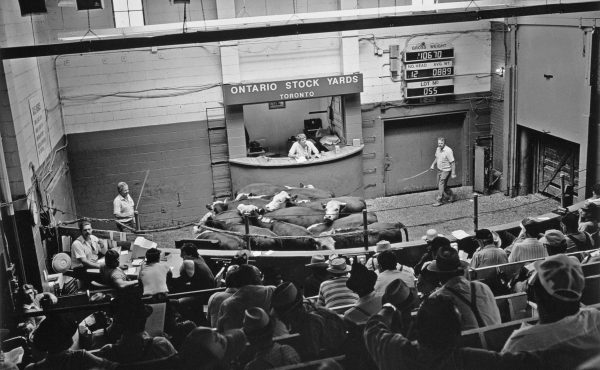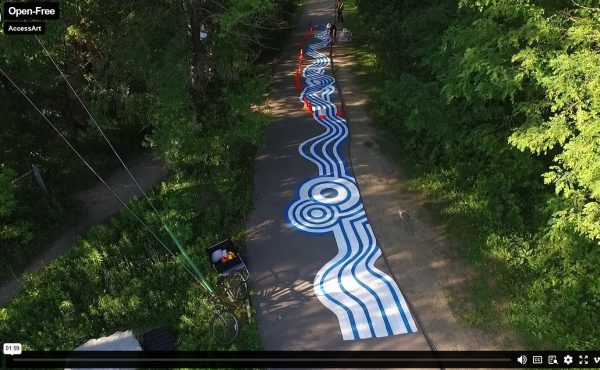I’m interested in the thoughts of Spacing readers on The Good Life campaign that WWF-Canada (aka my employer) launched yesterday.
Its goal is try and make visible what is now invisible outside of polling statistics — the public’s desire for action on climate change. We know that lots of people outside of the hard-core eco-crowd are now concerned (OK, freaked) about global warming. The question is how to take that concern and channel it into positive action to meet the challenge, rather than an ‘apres moi le deluge’ fatalism or ‘burn it now before someone else does’ survivalist response.
So we’ve set out to redefine ‘The Good Life’ from one of excess, to one where you live well, but lightly, on the Earth. A world in which people everywhere can lead happy, healthy lives within their fair share of the earth’s resources, while leaving space for wildlife and wilderness. It’s a big idea, so how to make it real and relevant to action on climate change?
Our idea is to not simply ask people to do all those things we need to do to reduce our contribution to global warming (drive less or not at all, use less energy at home, eat local and less meat…), but also to show how this adds up when we do it together (because we all know it seems pretty pointless to change a lightbulb if you’re the only one doing it). We’ve inverted the traditional carbon footprint approach, and rather than calculating how many greenhouse gases you put out (i.e how bad you are), we’re calculating how much you’ve saved by agreeing to change things in your life. And we’ve got a counter on the home page showing how many people have taken action and how this adds up in terms of kilograms of carbon dioxide — which means if this flops it’ll be out there for all to see, but so will its success.
Naturally, once you’ve taken some action in your own life, we’re asking you to demand political action — the first one being a call to the feds to support the California tailpipe standards. But at another level, if we can get enough people taking action, then it’ll help dispel the cynical calculations of some of the political backroom boys and girls about how politicians can get away with talking a good line, but voters don’t really want action to reduce greenhouse gas emissions.
One of the challenges is how do you reach those who are ready to change, but aren’t on any enviro-listserves yet. So our new tv and print ad campaign is backing all this up and driving people to the site with the message of change is possible.
[youtube]http://www.youtube.com/watch?v=GrlEQ15mVPM[/youtube]
Your thoughts on how to make this work / better would be much appreciated.





8 comments
Keith – for me it’s the transport sector.
People are tired of hearing about the multi-million$ in the waterfront transport follies, and I too grow tired of trying to motivate others to vex on it, and given how I’ve felt your former employer, TEA, is too close to the NDP, that’s been one source of possible existence that’s been shut out. But both the FSE and WWLRT are ill-advised and cost near a billion, and favour cars over effective transit. Duh!
More specifically for WWF – I caught an ad on tv that ended with showing a guy hauling down a bike. Nice set of contrasts ahead of it, but I started thinking about how the Big Bucks of the WWF really should go to help out cyclists like Geoffrey who was run down from behind on the Lakeshore this summer, and the cop looked the other way/blamed the victim – who is now bitter and injured and out of work.
I suppose using the FoI to pry out the notes for the constable and actually defending real cyclists who are harmed is beyond the WWF mandate, but even one, one of those ad spots would likely cover the FOI.
I’m reasonably sure I’ve used the apres moi le deluge phrase before – but it works. Have you heard the term carrupt? which I may have coined though it seems SOO obvious it must be around sooner. How about Pat’s term “Caronto”?
Oh, the cycling committee was kinda mugged by the way and by the Miller/NDP progressives. No subcommittees either.
Please consider weighing in on the Bloor bike lane issue, especially in the BYBIA segment between Church and Ave. Rd. perhaps going up to cttee in Feb. likely sans bike lanes, just wide curb lanes.
It will be good if they can get people signed up who aren’t already part of ‘the choir’ so to speak. I signed up this morning but alot of the stuff I already do. We’re limited to a degree because we rent but I already don’t drive, don’t eat meat, try to buy local, try to minimize packaging, use canvas bags, compost, recycle etc.,
One other thing that I do is, unless I’m buying something small (like grapes etc) I don’t use the clear produce bags. I mean I’m going to wash the stuff anyway so I don’t really see the point of them.
i was trying for a PS – didn’t see the earlier cmnt I thought I’d sent in – but the PS is:Do not believe the “Toronto’s so Green” hype. The back pages of the Wtfrnt Env Scan of maybe 2005 had the greenhouse gas profile of the City being 20% above the stabilization level and nowhere near the Toronto Target.
So the City says we’re Green, but only by ignoring to the point of lying about the numbers/problems – and no one really calls them on it. So council unanimously reaffirms targets and goals but also unanimously okays urban oil spills like the demolition of the Riverdale hospital building, and is still having difficulty with trying to do effective transit on the waterfront.
I’ll check later to see if the first cmnt was swallowed by electronica somewheres.
Keith,
The majority of people – and not just people who are genuinely concerned about the environment and invest their own energy to finding out how to live ‘greener’ – must be made aware of the level of greenwashing that goes on in the marketplace. A list of greenwashers and a list of companies that genuinely care for the environment should be a part of your website.
You should also have a google map that pinpoints where you can recycle non-blue box recyclables like batteries or cork.
In terms of advocacy, WWF should push governments to completely reform the packaging industry. Something like the German Grà ¼ne Punkt system, where customers ripped extra packaging and left it behind at the checkout counter, is a good start.
I love the commercial. I personally think this exactly the way to create change in the masses.
Environmental and Alternative Transportation Education is great. But boring. The people don’t want to lectured. They want to be sold. Produce slick ads just like the car companies. Sell people on the idea that if they use their bikes and/or mass transit to commute they will become better looking and have more sex and watch the sheep fall inline.
It sounds cold, I know. but it is also the truth. Stop educating and start selling.
http://www.streetsblog.org/2007/04/18/bicycle-advocacy-tv-ads-from-the-netherlands
‘Nikromatt’, the Dutch (who else?) have just such ads. Why aren’t the bike manufacturers paying for them? They have something to gain by bike advocacy, you’d think.
Maybe times have not changed hence the need for all the mice type disclaimers in that ad.
All of the actions you’re asking people to take are still essentially negative–reduce your impact; be less destructive to the earth. Are there things you can ask people to do that will actually be constructive? That will actually heal the earth, rather than just hurting it less?